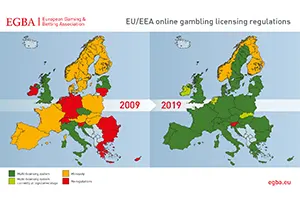 The European Gaming and Betting Association (EGBA) has released a new analysis exploring the multi-licensing model for online gambling in Europe and indicating it is picking up speed in different jurisdictions across Europe.
The European Gaming and Betting Association (EGBA) has released a new analysis exploring the multi-licensing model for online gambling in Europe and indicating it is picking up speed in different jurisdictions across Europe.
Some fifteen years ago, most countries either lacked legislation for remote gambling or had a monopoly-based model authorizing only state-owned entities to provide gambling products. Under the multi-licensing model, multiple gambling companies can operate within a particular market if they comply with the established rules and regulations.
The Brussels-based industry association, representing the leading remote gambling operators within the EU, has focused on the provision of regulated online casino gaming, sports betting, bingo, and poker in 31 European countries. While in 2009, only 7 countries employed this multi-licensing approach, nowadays, most gambling regulations are built around it.
EGBA’s analysis has singled out some key findings. To begin with, the analysis indicates that some form of the multi-licensing model is implemented in 27 out of 31 European countries, showing a strong tendency to competitiveness. Finland, Iceland, and Norway’s markets still operate under state-owned monopolies, whereas Luxembourg lacks a regulatory framework for online gambling. The full multi-licensing model has been successfully implemented in 23 countries.
There are four countries where a partial multi-licensing model is in force and these are Slovenia, Switzerland, Austria, and Poland. The first two still maintain a monopoly over sports betting, while the other two keep a monopoly over online casinos and poker. All other gambling products are offered under the multi-licensing model.
Similarly, the online gambling markets in Cyprus and France have prohibited casino gaming, but all other regulated gambling products are accessible through the multi-licensing approach.
Finland is currently in a transitional period, with expectations to fully implement the multi-licensing model by 2026.
“The Momentum Towards Full Multi-Licensing for Online Gambling in Europe is Undeniable”
 Maarten Haijer, EGBA’s Secretary General, has commented on the findings of the analysis, highlighting the tendency toward the implementation of the multi-licensing approach to online gambling. While there are still a few exceptions, markets that allowed healthy competition exhibited stronger consumer protection mechanisms, more effective tax generation, and robust regulatory control.
Maarten Haijer, EGBA’s Secretary General, has commented on the findings of the analysis, highlighting the tendency toward the implementation of the multi-licensing approach to online gambling. While there are still a few exceptions, markets that allowed healthy competition exhibited stronger consumer protection mechanisms, more effective tax generation, and robust regulatory control.
He also said that Finland’s transition to this model “signals the impending end of the last online gambling monopoly in the EU, marking a significant regulatory milestone.”
As for Norway and Iceland, Mr. Haijer commented that similar developments were “inevitable”. Additionally, the Secretary General advised that markets where partial monopolies still existed or limitations on particular products were in place, “should strive for greater consistency and effectiveness in their policies by phasing these out.”
Maarten Haijer concluded his statement by pointing out that “the last remaining European countries” should “embrace this optimal form of online regulation.”